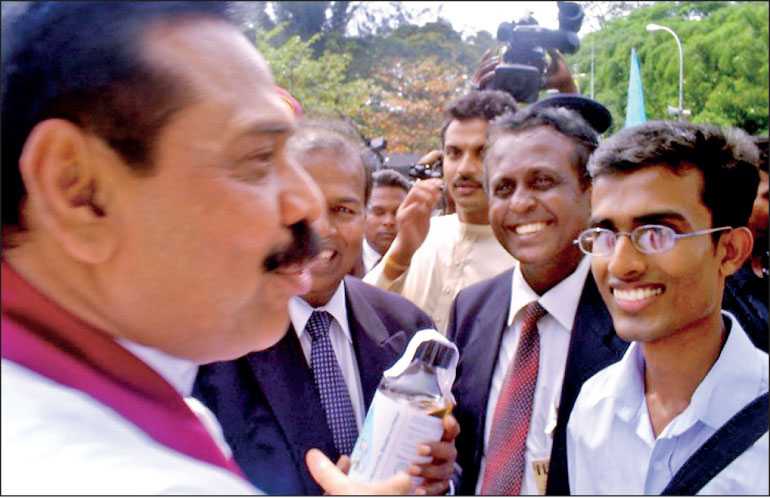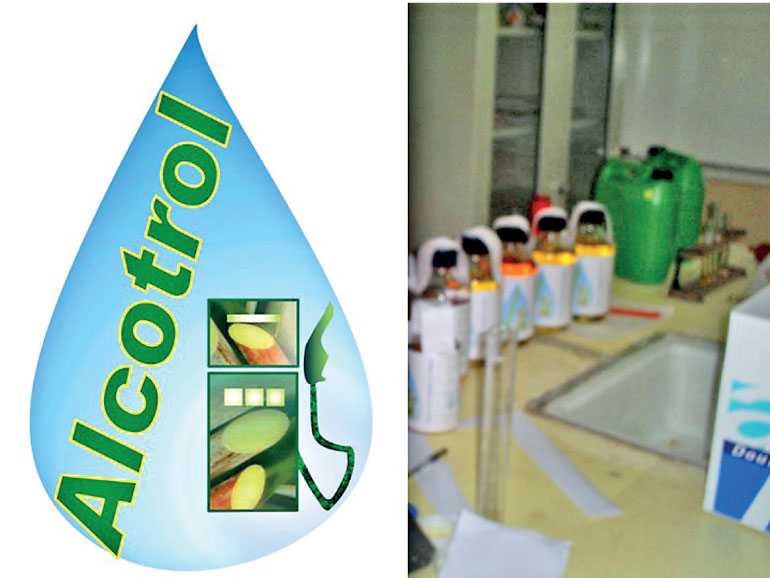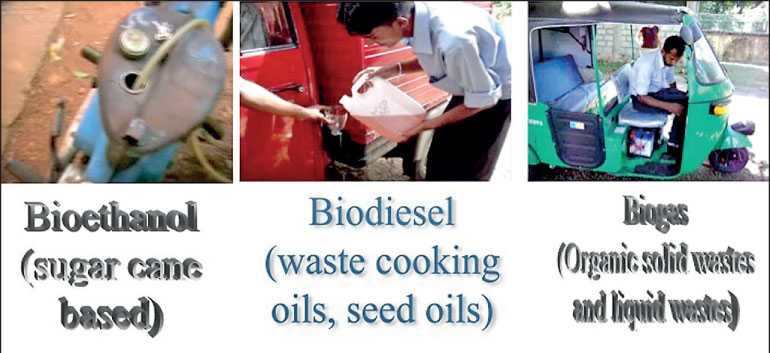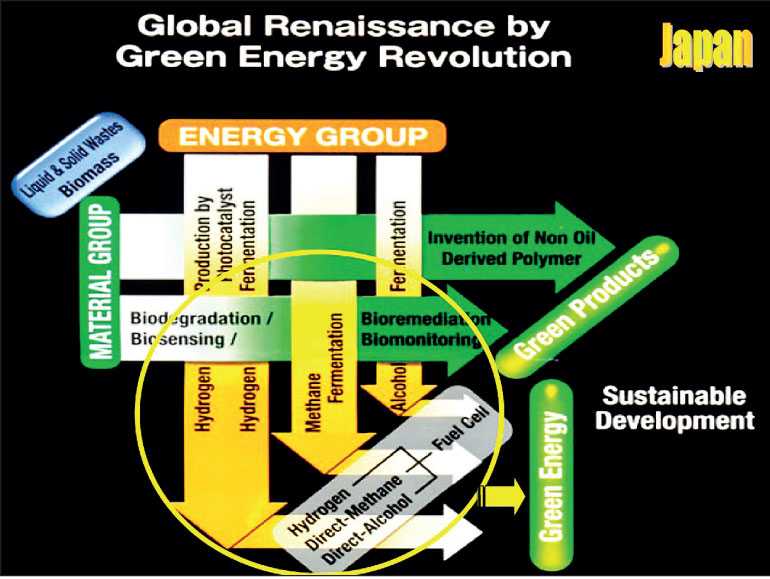Monday Feb 16, 2026
Monday Feb 16, 2026
Thursday, 21 May 2020 00:00 - - {{hitsCtrl.values.hits}}

The fuel ethanol we developed had the name Alcotrol and was demonstrated to then President Mahinda Rajapaksa

The fuel was produced as anhydrous alcohol and we used the adsorption technique

Another demonstration we made subsequently was making use of waste to energy and for transportation
The virus affected people with impaired immunities as it was after all your own immunity that was expected to fight the SARS-Cov-2 as there is no vaccine, no drugs to treat COVID-19 – not as yet anyway. Quick fixes are delusionary as injections of disinfections or basking on UV as had been indicated by some. There is also the issue of too much immune response causing issues – cytokine storm – however you do not want to hang around the virus if you have an impaired immunity for sure.
There is a lesson therein broadly managing economies as well. An economy with multiple weaknesses with little or no resilience is a sitting duck when problems surface and a pandemic is an issue like no other! Many an economy today are earmarked for life support but some do have inner abilities to pump in oxygen. For many unfortunately ‘Hope’ has become the ‘Strategy’.
The power system
There was the bold claim about the better service stability of the power system during the curfew period in Sri Lanka. Personally for me the claim was right only experiencing about three to five power outages – even those very brief – during the period. The electricity demand it has been stated has come down by about 30%. Whatever did stop had contributed more to the fall in demand than the increased consumption perhaps happened by many sitting inside homes during the curfew.
We do have a significantly dependent energy system with dependency varying from the reliance on nature to reliance on the outside. Renewables and hydro rely on nature. Coal, oil and gas refer to the reliance on the outside. The sun shines on us for more hours per day than the country that holds the solar rooftop record. We receive more rain than the country that holds the record for rainwater harvesting from rooftops. The country in both cases is Germany.
This demonstrates the potential we have in making use of nature. Yes today there is a drive to have 80% renewables in the power grid. It should be a technical desire to wean off the grid at least for a day from a fossil fuel as UK and Germany has demonstrated. Sri Lanka has produced cement once to prove that waste can indeed give the energy that the process wants. Sri Lanka also had the first village in the world to run on renewables. Such demonstrations are well worthy of emulation as energy security directly correlate to national wealth.
Our energy system is not climate friendly. Yes it is true that Sri Lanka is not a significant contributor of greenhouse gases and thus not that great a climate criminal. The issue is still we spent billions of dollars on fuels to power the transport system and there the external dependency is 100%. Many countries and notably Brazil has shown the importance of pursing alternate fuel strategies. Even countries with fossil fuel reserves, have pursued alternative strategies to improve on climate performance of the energy system and invariably these schemes being hinged on renewables gives the added benefit of national supply chains for energy resources.
|
The ultimate demonstration was giving a lift to then President and Finance Minister Mahinda Rajapaksa to Parliament to deliver the Budget Speech
|
National supply chains have become a mainstream topic with countries still struggling through the virus. Suddenly most are discovering the stress busting effect of having manufacturing closer to home and preferably at home. Also with unemployment mounting there is definite attraction for manufacturing in employment generation compared to services where when the shots are played from outside they had to grapple with huge uncertainties.
At one point in time, call centres may have been a low cost opportunity. With COVID-19, call centres are finding humans replaced with Bots and AI. COVID-19 definitely accelerated the demise of certain job forms and most certainly accelerated the deployment of new skill sets, which spells doom for general services, which we have been subservient for too long.
Renewables
Provision of energy is a service. However when renewables form the input the drivers are then inside and the amount of jobs that could be created are significant. Due to the inherent variability of renewables, completely different types of jobs too would be required.
Renewables definitely need to be accelerated. Some bold decisions should be taken and this is indeed the time for such moves. I remember the failure to move a solar silicon production due to power not being made available to the furnace – around 3MWe. However we have installed 1 MWe generators side by side and generate electricity to power watching teledramas.
Again I am reminded when the cost of a barrel of oil reached 141 dollars in the world market the amount of activities that we were involved in. COVID-19 interestingly showed to us the unimaginable in oil markets of the producer paying somebody to remove some oil from storage thus driving the prices below zero! Another answer to those who at times level the charge of universities not being responsive as well as not working with industry.
I remember the intense work that we were engaged with pushing policy and regulations as well as practical demonstrations. It was possible to support even legal provisions preparations as we had a chemical engineer qualified in law and with work and research experience in fuel ethanol in USA. Today many of those brains used have drained!
In the Department of Chemical and Process Engineering (UoM) we worked with Ariyaseela Wickramanayake and his two companies Master Divers and Pelawatte Sugar. With Master Divers it was on waste to energy – biogas for transport fuels, which was supported by P.G. Joseph of the Ministry of Science and technology. With Pelawatte Sugar the effort was in developing fuel ethanol.
All efforts were not new ground breaking inventions. Those efforts were merely redoing what others have done long time back elsewhere. Yet we had points to prove from possibility to economics. Usually the answer had been do not even try this in Sri Lanka. Also with alcohol there is the statement ‘let us first meet the internal demand for drinking and then we will give the rest’. We never factor in how much we spend in free medication. Perhaps today and in light of the climate debate a different but a more conducive answer is available.
Alcotrol
The fuel ethanol we developed had the name Alcotrol and hope you can sense the colloquial name petrol fused to alcohol. The fuel, produced as anhydrous alcohol, had to be developed and we used the adsorption technique moving away from the usual method to use a much more viable technique locally.
The ultimate demonstration was giving a lift to then President and the Finance Minister Mahinda Rajapaksa to Parliament to deliver the Budget Speech. The idea was to mention that the journey to present the Budget was made with a local fuel and by pursuing such options we can strengthen the economy. However we know that this was not to happen.
With world oil prices coming down, the interest on alternative fuels receded at a much faster rate! As per the Economic Intelligence Unit of the Ceylon Chamber of Commerce the expenditure on different energy sources from outside are for 2019 crude oil – $ 971 m, refined oil products – $ 2,706 m, coal $ 215 m and LPG $ 241 m. It is easy to see the billions in dollars involved with the energy system of Sri Lanka.
While the curfew was on coal was unloaded at Norochcholai but on the crude oil front we were not able to benefit from purchases as we lack strategic storage capacity. If we have been driven with a vision Trinco tanks would have been available to store and deliver. Important to contemplate the opportunity cost of even planning for 1% fuel import bill reduction from different renewables and waste. That is money pumped into the internal economies. However this is not to say to develop a closed growth mindset but a way of enhancing the economic stability through strengthening internal systems. Remember today it USA that is producing the most bioethanol and that is a strategic use.

Waste to energy
Another demonstration we made subsequently was making use of waste to energy and for transportation. This again is possible and it is sad to see the biogas plant identified from Colombo waste is finding its progress hampered.
With biogas generated from an AD plant there are many options – electrical energy to the grid, production of compressed synthetic natural gas for transport and even the possibility of hydrogen, which many consider as the next energy economy. When working on options one should not just consider simple rupee economics of today derived at times through obsolete processes which some are trying to export to outside for making some additional returns from already dead systems within and we succumb to such proposals and the future is compromised. In each of the renewable options there are advanced opportunities as well – algal biofuels, cellulosic biofuels which utilise waste biomass and biohydrogen.
Sri Lanka has to think in a more scientifically advanced manner as a nation which has easy access to renewables and must not just wait to see in making decisions based on Rs per kWh after the developments have taken place elsewhere. A resilient energy system does not have systemic weaknesses to get affected in an adverse situation. There is immunity within to fight back and deliver.